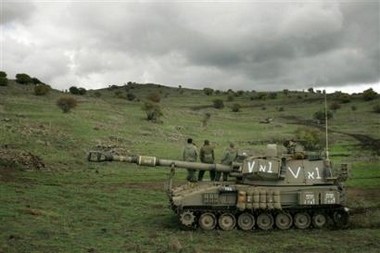 By Mark Turner at theUnited Nations, The United Nations has called on the Lebanese government to explain allegations that the Lebanese army aided the transfer of weapons from Syria to Hizbollah, the Iranian-backed militant Islamic group.A UN Security Council resolution, adopted in 2004, called for the withdrawal of foreign forces from Lebanon and the disbanding and disarmament of all Lebanese and non-Lebanese militias.
By Mark Turner at theUnited Nations, The United Nations has called on the Lebanese government to explain allegations that the Lebanese army aided the transfer of weapons from Syria to Hizbollah, the Iranian-backed militant Islamic group.A UN Security Council resolution, adopted in 2004, called for the withdrawal of foreign forces from Lebanon and the disbanding and disarmament of all Lebanese and non-Lebanese militias.
UN officials have warned for some time that weapons and personnel are flowing from Syria to militia in Lebanon, but the issue had taken a relative back-seat during an international investigation into last year’s murder of Rafiq Hariri, the former Lebanese prime minister.It rose to new prominence, however, following allegations that several truckloads of light weapons and missiles were transferred on January 31, after which, according to officials, the Lebanese army all but acknowledged it was playing a role.
"If this information were to be confirmed it would be an alarming development in clear violation of resolution 1559," said Terje Roed-Larsen, the UN envoy monitoring compliance with Security Council demands.
In a statement this week, the Lebanese army said the transport of "ammunition belonging to the resistance" to southern Lebanon was governed by ministerial policy, although it also claimed the supplies had been stored inside the country.
"The government considers the Lebanese resistance a genuine and natural expression of the Lebanese people’s national right to liberate their territories . . . in the face of Israeli aggressions," it said.
John Bolton, the US ambassador, yesterday said the facts still had to be established. But he warned that the text of resolution 1559 was clear.
Analysts said the issue highlighted Lebanese government fears of a confrontation with Hizbollah. But Walid Jumblatt, the Lebanese Druze leader, gave the flow of weapons new prominence with public statements this weekend.
While the US and France, who have led UN policy on Lebanon, shied away from detailed pronouncements on the army’s alleged role, officials said they were concerned, and were considering how and when to pressure the government of Fouad Siniora to stop it.
Meanwhile, one UN diplomat suggested that the international inquiry, led by the International Criminal Court’s deputy prosecutor Serge Brammertz, could slow down as he shored up evidence to satisfy international legal standards.



